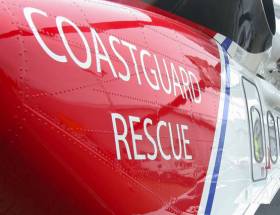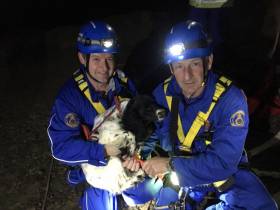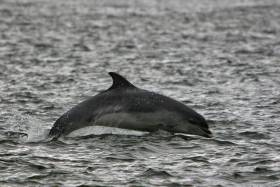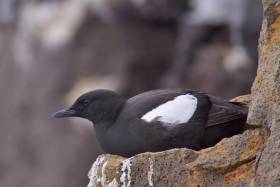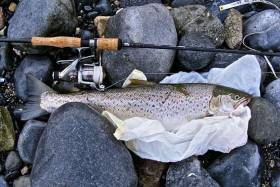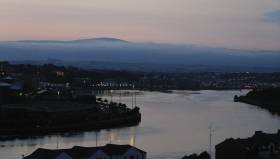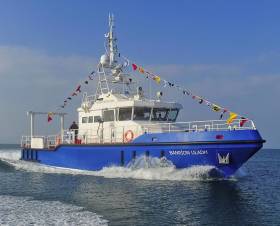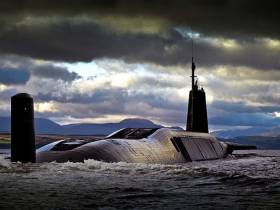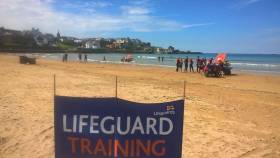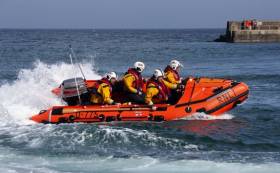Displaying items by tag: Northern Ireland
#Surfing - “It was just… nothing. There is only blackness.”
That’s how Scottish surfer Matthew Bryce describes his terrifying ordeal adrift on his board in the North Channel for 32 hours.
According to the Belfast Telegraph, the 23-year-old recently returned to Campbelltown in Argyll a month after what was supposed to be a morning riding the waves turned into a nightmare.
The young man was finally rescued from the sea off Northern Ireland on 1 May, more than a day after getting pulled away from the shore, as previously reported on Afloat.ie.
Bryce expressed his appreciation to the local RNLI and coastguard teams, who worked with their counterparts in Northern Ireland to search the sea by boat and air.
He also appealed to anyone else going surfing to avoid the mistakes he made in surfing alone, without GPS or means to contact anyone on shore.
The Belfast Telegraph has much more on the story HERE.
#Rescue - Coastguard units from Ballycastle and Coleraine were tasked on Friday night (26 May) to the aid of a dog fell more than 30 feet off a cliff near the Giant’s Causeway in Co Antrim.
The coastguard teams used their specialist rope rescue equipment to lower a technician down the cliff to secure Bell the springer spaniel and lift her up to her grateful owners.
Belfast Coastguard reminds anyone with pets on or near the water to keep them on leads, especially close to cliffs. If an accident should happen, don't attempt a rescue yourself – always call the coastguard who are trained for the purpose.
In other news from the North Coast, the iconic Carrick-a-Rede rope bridge is closed until further notice after vandals attempted to cut it down.
TheJournal.ie has more on the incident last week, as the National Trust awaits investigation by structural engineers to determine the extent of the damage to the coastal tourism attraction.
NI Scientists Head Whale & Dolphin ‘Listening’ Project
#MarineScience - Scientists from Northern Ireland will lead a new project monitoring whale and dolphin sounds off the Scottish and Irish coasts, as BBC News reports.
The scheme led by the Agri-Food and Biosciences Institute (AFBI) will see a network of buoys deployed with devices to pick up cetacean chatter – as well as potentially harmful ocean sounds from sea traffic or industry.
"Displacement from noise is a very real effect and ... if it doesn't cause them to move will change their behaviours and, at the most acute levels, can cause physical and physiological damage to the animals,” says Dr Adam Mellor of the AFBI.
BBC News has more on the story HERE.
Black Guillemots & Ancient Clams Gain New Protections In Northern Ireland
#MarineWildlife - The RSPB has welcomed the announcement of new marine protected areas for Northern Ireland this week.
“The formal designation of four new marine protected areas will help protect a range of vulnerable species and habitats - ranging from black guillemots to ocean quahog and seagrass meadows,” the wildlife charity said in a statement.
Among the new Marine Conservation Zones (MCZs) announced by Storming is an area near Rathlin Island off Co Antrim that’s the first in the UK to be set aside for a seabird species, the amber-listed black guillemot.
The other new zones announced include seagrass meadows in Waterfoot, also in Co Antrim, and the fragile ecosystem for sea pens in Carlingford Lough.
Also included among the new MCZs is the territory of ocean quahogs in outer Belfast Lough.
According to The Irish News, these clams are thought to have been thriving in the waters near the city for over 200 years - and individual clams could live for hundreds more.
The Stormont announcement comes a year after the new zones were first proposed for public consultation, as previously reported on Afloat.ie.
NI Govt Portal Has ‘Transformed’ Fishing Permit Process
#Angling - Northern Ireland’s new online fishing permit application system has “transformed” the industry, as the Belfast Telegraph reports.
The new NI government web portal, designed by Belfast firm Kainos with BT, enables anglers and commercial fishermen to apply for a range of permits and licences with the Inland Fisheries Group via a single channel.
Underpinning the service is a “shared management information system” that means less paperwork and increased efficiency for users and local permit providers alike.
Earlier this year, all paper-based angling permits in Northern Ireland were replaced by electronic records, as previously reported on Afloat.ie.
NI Anglers Concerned By Rise In Pollution & Poaching
#Angling - Pollution and poaching are a growing concern for anglers in the Carlingford and Lough Foyle areas, as Derek Evans reports in his latest Angling Notes for The Irish Times.
New figures from the Loughs Agency reveal a significant raise in pollution, the worst incident of which occurred this past August when hundreds of salmon fry were lost in a fish kill on the River Faughan, according to the Derry Journal.
In addition, the Loughs Agency report informed NI Environment Minister Michelle McIlveen of almost double the number of fishing gear seizures this year compared to 2015, as well as a sharp rise in court actions.
The Irish Times has more on the story HERE.
Storm Over Name Change For NI Fisheries Patrol Vessel
#BanríonUladh - A Northern Irish minister has sailed into stormy waters after rechristening a fisheries protection vessel from its Irish name to its English translation, as the Belfast Telegraph reports.
Banrion Uladh — which patrols the Irish Sea between Lough Foyle and Anglesey in North Wales — is now Queen of Ulster after the change by Agriculture Minister Michelle McIlveen, whose DUP expressed upset over the original naming of the vessel by then minister Michelle Gildernew of Sinn Féin in 2010.
The renaming, which was carried out during scheduled repairs, is cited as part of a move by Minister McIlveen’s department to a single-language policy in the new Department of Agriculture, Environment and Rural Affairs.
The Belfast Telegraph has more on the story HERE.
NI Waters Not Deep Enough For Trident Subs Says MLA
#Trident - Trident won't be coming to Northern Ireland - as there are no waters deep enough to host the nuclear deterrent submarines, according to one MLA.
As the Belfast Telegraph reports, Ulster Unionist MLA Steve Aiken says that from his own experience, the region has no suitable deepwater ports or inlets necessary for the 150m-long Vanguard-class submarines in the Trident programme, which are currently stationed off western Scotland.
"It's not deep enough, we can't do it," he said. "I tried to bring my submarine, HMS Sovereign, to Belfast towards the end of its time.
"Because you need deep water at all states of the tide, even though entrance to Belfast Lough is dredged to 10 metres, it's not deep enough.
"You can't bring it into Larne because there is a rock sill coming into Larne Lough which you would have to blast out; same for Carlingford Lough, and Lough Foyle is too shallow."
The Belfast Telegraph has more on the story HERE.
#Lifeguards - RNLI lifeguards will commence full-time summer patrol on 10 beaches in Northern Ireland from next Saturday 25 June.
Following a busy period of intensive training in preparation for the new season, the lifeguards will be keeping visitors safe on seven beaches along the Causeway Coast and three in Co Down.
The beaches include Benone, Downhill, Castlerock, Portstewart Strand, Portrush West, Portrush East, Whiterocks, Tyrella, Murlough and Cranfield.
From next weekend, the RNLI will take up full-time daily duty on all beaches continuing to Sunday 4 September, when weekend duty will then resume on selected beaches throughout September.
Lifeguards will be on the beach daily between 11am and 7pm on the Causeway Coast and between 10am and 6pm in Co Down.
Speaking ahead of the new season, RNLI lifeguard manager Mike Grocott is encouraging those planning a visit to the beach this summer to bear in mind some key water safety messages.
"The RNLI’s advice for anyone planning a trip to the beach is to check weather and tide times before you go and if planning to go into the water, swim at a lifeguarded beach, between the red and yellow flags," he says.
"Avoid using inflatables in strong winds or rough seas. If you get into trouble, stick your hand in the air and shout for help and if you see someone else in trouble, tell a lifeguard. If you can’t see a lifeguard, call 909 or 112 and ask for the coastguard."
The RNLI is running its annual national drowning prevention campaign Respect the Water throughout the summer months with the charity this year warning the public to watch out for key dangers that can catch people out in or near water.
Central to the campaign are the dangers that can lead to accidental drowning: cold water, unexpected entry into the water, and rip currents and waves.
Newcastle Lifeboat Launches In Leisure Craft Breakdown
#RNLI - Newcastle RNLI brought two people to safety on Wednesday evening (1 June) after they got into difficulty off the Dundrum coast in Co Down.
The volunteer lifeboat crew was alerted shortly before 8pm following a request by Belfast Coastguard that a vessel with two onboard had broken down in Dundrum Bay.
The inshore lifeboat, helmed by Niall McMurray with crew members Declan Barry and Karl Rooney onboard, launched within minutes to the incident. Weather conditions at the time were described as good with a flat, calm sea.
Once on scene, the lifeboat crew observed that the 17ft leisure craft had experienced engine failure. The crew checked that the two on board were safe and well before establishing a tow line and proceeding to bring the vessel safely back to Dundrum.
Speaking following the callout, McMurray said: "Thankfully both people were not injured and we were able to help bring them safely back to shore.
"We would encourage anyone planning to go in or near water especially during this hot weather spell to enjoy themselves but to always respect the water.
"Check your boat and equipment before every trip, carry a means of communication should you get into any difficulty and always wear a lifejacket."


























